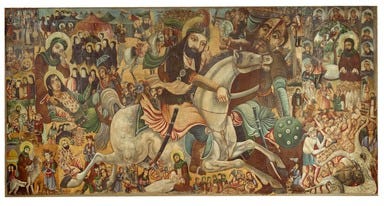Sinwar at Karbala
Plus, betting on the tortoise

Hamas Gaza leader Yahya Sinwar’s messages are the subject of a Wall Street Journal article. It concludes:
In a recent message to allies, the Hamas leader likened the war to a 7th-century battle in Karbala, Iraq, where the grandson of the Prophet Muhammad was controversially slain.
“We have to move forward on the same path we started,” Sinwar wrote. “Or let it be a new Karbala.”
This is such a revealing insight into the thinking of the Hamas leadership. He’s not thinking about Israel’s creation in 1948 or Israel’s takeover of the West Bank in 1967. He’s thinking about the Battle of Karbala, said to have happened on October 10, 680. The Britannica reports that in that battle, “a small party led by al-Ḥusayn ibn ʿAlī, grandson of the Prophet Muhammad and son of ʿAlī, the fourth caliph, was defeated and massacred by an army sent by the Umayyad caliph Yazīd I.”
You’ve heard of Barack Hussein Obama? King Hussein of Jordan? Saddam Hussein of Iraq? Yahya Sinwar is ready to make himself into another Husayn, martyred by a much larger and more powerful force but venerated and influential in memory for centuries to come.
It may seem delusional in its grandiosity. But it helps to explain why lasting peace in the Middle East has been so elusive. Americans, particularly secular Americans in universities or at large news organizations or in the U.S. government bureaucracies such as the State Department or the CIA populated by American graduates of secular universities, look at this conflict and try to explain it by saying, let’s have a real estate compromise and economic development and ameliorate the effects of “European settler-colonialism” and we can all live happily ever after. Yes, it is true that plenty of Arabs and Muslims would like the economic benefits of partnering with Israel’s high-technology economy and would prefer peace and prosperity to suffering and war. And, it is also true that there are others, including Sinwar, who see themselves as reenacting the Battle of Karbala.
Unless and until American and Israeli policymakers and professors and journalists think about 680 as much as they think about 1948 and 1967, they’re going to be frustrated in understanding what’s happening in the Middle East, let alone in trying to reshape the region in a way that is more prosperous and peaceful.
Big policy wins can take decades to achieve: When the Supreme Court, in 2023, ruled against Harvard and outlawed the use of racial preferences in college admissions, Jerome Karabel, in the New York Times, traced it back to a 1970 article in The Public Interest.
Fifty-three years is a long haul in the politics-and-policy world, but a new study of ten federal policy advances found, “On average, those big policy victories came from at least 40 smaller wins over the course of about 25 years of structured work.”
“Like the proverbial tortoise, slow and steady wins the race,” says the Bridgespan Group and Civitas Public Affairs Group study, “Betting on the Tortoise: Policy Incrementalism and How Philanthropy’s Support Can Turn Small Sustained Steps into Big Impact.”
The study looks at initiatives including marriage equality, marijuana legalization, women’s suffrage, abortion legalization, abortion restriction, Social Security, sentencing reform, and Second Amendment protections for handgun ownership and finds most of them took decades to achieve.
Other common elements included “multiple battlefields with the potential for wins,” including local and state governments, “narrative change,” “embracing strange bedfellows,” and creating “intermediary organizations.”
One of the study’s authors, William Foster, happens to be a friend. I called him to ask how someone might know, a decade or two in, whether a project will wind up on a future list of successes or on a list of projects that people spend decades and lots of money on but don’t wind up succeeding. Keep going? Or cut your losses and give up? “There’s definitely things where people kind of putter away forever,” he told me. He said long-term success is more likely when leaders take a strategic, incremental mindset, adjusting to feedback rather than rejecting compromises. “Wins beget wins,” he said.
Program note: The Editors is not planning to publish Wednesday June 12 or Thursday June 13, which are the Jewish holiday of Shavuot. We plan to be back on Friday June 14.
Wins beget wins: We consider each subscriber to The Editors a win. Thank you! Please help us grow by sharing the newsletter with someone else in your network who might enjoy reading it.


